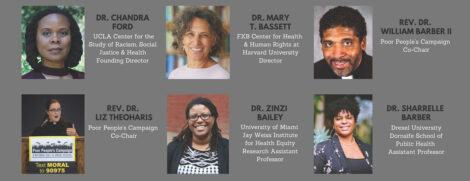November 5, 2020—Scientists should talk about issues such as systemic racism, affordable housing, and precarious jobs in order to fight health disparities, according to Harvard T.H. Chan School of Public Health’s Mary Bassett.
Speaking at an October 28, 2020 virtual panel discussion titled “The People’s Health In Crisis: Reflections on Poverty, Racism, and the Fight to Defend Democracy,” Bassett, François-Xavier Bagnoud Professor of the Practice of Health and Human Rights and director of the FXB Center for Health and Human Rights, said, “This is public health. These are the root causes of COVID-19 and other health inequities.”
Bassett said that COVID-19 deaths among Black, Latinx, and Indigenous Americans—three-fold higher than for white Americans—provide a stark example of disparities.
The event focused on the work of the Poor People’s Campaign, a nonpartisan social justice movement that mobilizes low-income people to be agents of social change. Bassett joined the group’s Health Justice Advisory Committee in April as it turned its focus to the racial and socioeconomic disparities in COVID-19 infections and deaths.
“Over the past months, it’s become abundantly clear that the United States, one of the wealthiest and most medically advanced countries in the world, has tragically failed to respond to the biggest public health threat of our time,” Bassett said. The advisory committee calls on hospitals and health departments to report COVID-19 cases by income, race and ethnicity, and other relevant demographics, to ensure that prevention efforts and treatment are equitable.
The panel discussion was moderated by Zinzi Bailey, SD ’14. Sharrelle Barber, SD ’14, offered opening remarks.
People’s Campaign Co-Chair Rev. William Barber II noted that even before 1,000 Americans a day were dying from COVID-19, 700 were dying daily from causes related to poverty.
Co-Chair Rev. Liz Theoharis said that the group tries to not just “curse the darkness,” but to come forward with “solutions, light, and possibility.” She spoke about the importance of research that illuminates the public health consequences of poverty and systemic racism, in addition to the benefits that investments in things like education and living-wage jobs can have on health.
In closing remarks, Chandra Ford of UCLA’s Center for the Study of Racism, Social Justice and Health, noted that thousands of studies have examined links between social injustice and poor health. It is now time, she said, to move beyond documenting health disparities to doing research work, in collaboration with community partners, that employs anti-racist and social justice approaches to advance health equity.
